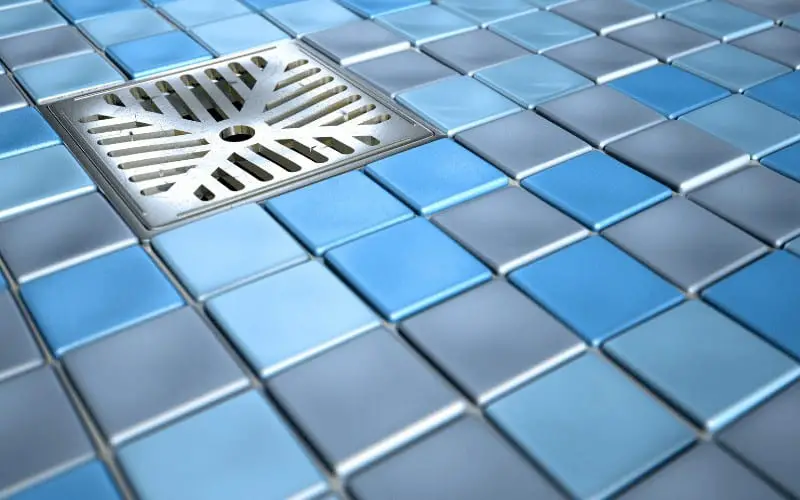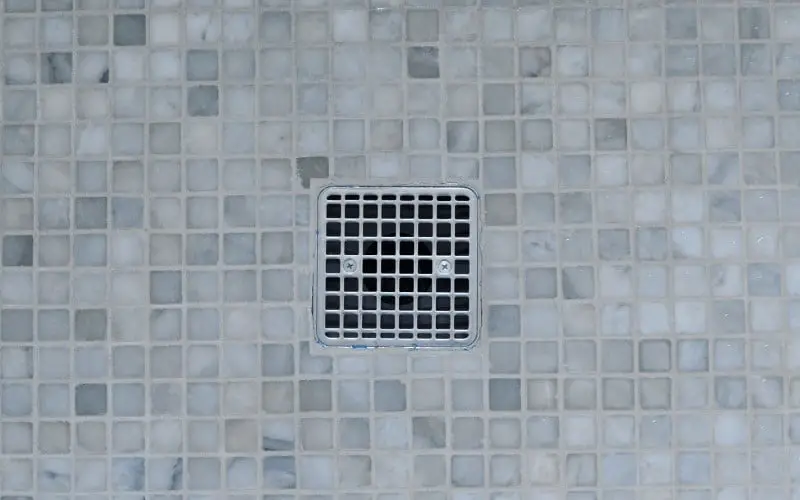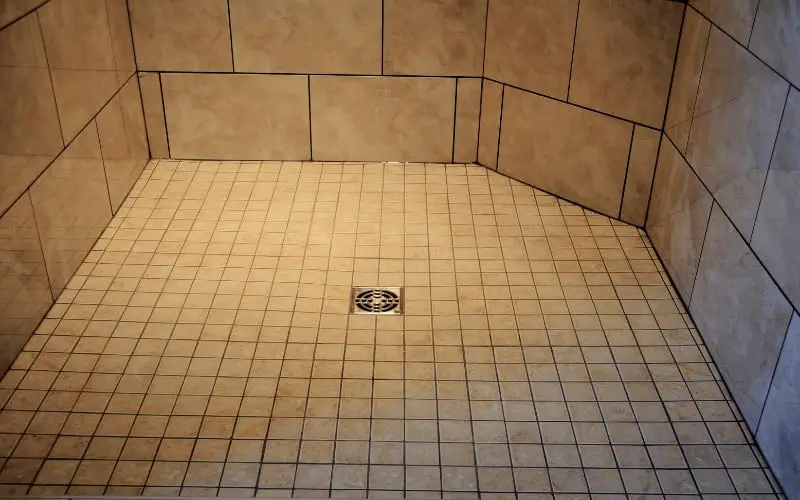You must have an idea on how to clean shower floor if you want to avoid the accumulation of grime, scum, and hard water deposits on your shower floor.
The type of Cleaning techniques to use on your shower floor depends on the type of floor it has and how deep you want the cleaning to get, especially if the bathroom is very dirty.
But today, we’re going to be looking at easy cleaning techniques with homemade cleaning solutions that can be used on a lot of different types of floor without damaging it. So if you want to know how to clean shower floor, keep reading.
How To Clean Shower Floor
Table of Contents
Removing Soap Scum
If you are going to clean your shower floor, you might as well remove soap scum from the walls.
Step 1 – Using Vinegar
Start by allowing hot water to run for 10 minutes; this helps to open the pores of the tiles, making it easy to clean.
Next, mix one-part water to one part vinegar, mixing them until they are well combined, then pour the mixture into a spray bottle.
Apply the mixture to the tile as well as its grout, then allow the mixture to sit for anywhere between 5 minutes to 30 minutes, depending on how dirty the wall tile is.
Take a stiff bristle brush or a grout brush and begin scrubbing the soap scum. This helps to loosen the soap scum so that it is easy to rinse off.
Then use warm water to rinse the tiles. You can either use your shower or a bucket for this. And your bathroom wall tiles should be sparkling. You can also go into missed spots with the vinegar and water mixture and repeat the process.
Step 2 – Baking Soda
In a bowl, add three parts baking soda and 1 part water and mix it thoroughly until it forms a thick paste; it should have a toothpaste-like consistency. If your mixture is runny, you need to keep adding baking soda until it reaches the described thickness above.
You can substitute half of the amount of water for hydrogen peroxide when dealing with tough stains.
Also, in the absence of baking soda, you can also make use of a tile cleaner, should in case you don’t want to use baking soda.
Using a clean sponge, apply the baking soda to the tile making sure to apply a generous amount to the grout, as it is usually the dirtiest area.
Then spray that vinegar and water mixture mentioned above to the areas you applied the baking soda. This will cause a bubbling reaction, and The vinegar will help the paste eat through the soap scum.
Next, use a stiff bristle brush or grout brush to start scrubbing your tile in circular motions. You need to apply firm pressure when scrubbing in order to remove tough stain and also to get all the dirt out from the grout.
Using a pitcher or bucket, pour water all over the tiles, making sure to remove all the soap scum, and the residue is completely removed. This may take up to five times of rinsing.
Finally, use a clean towel to dry your tile; this will prevent water from being stored in crevices of this wall, which can cause the growth of mold and mildew.
Cleaning Your Shower Floor
Before we get into the process, if you happen to have a fiberglass shower or tub, avoid using abrasive cleaners like scouring powder or ammonia as they can scratch the surface.
Try using only nonabrasive cleaners like dishwashing liquid, liquid laundry detergent, all-purpose cleaner, and a soft scrub product like sponge, brush, or cloth that is made from polyethylene, polyester, or nylon.
When scrubbing your shower floor, you want to be as gentle as possible. Use only a non-abrasive cleaner and a soft scrub product. In cases where you encounter tough stains, you can make use of stronger cleaners to remove it.
Finally, rinse the floor surface with water when you are done scrubbing and use a soft clean towel to dry the shower floor.
Removing Tough Stains From Shower Floor
For tough stains on your shower floor, here are some ways you can remove them.
Baking Soda
In a bowl, mix a small amount of baking soda and water till it forms s paste. Then apply it to the shower floor and allow it to sit for a couple of hours before rinsing it off with warm water. This works perfectly for soap scum and light stain but not for hard watermarks.
Vinegar
Vinegar is also a fix for dirty shower floor, and it effectively removes tough soap scum stains and hard water deposits.
You can either mix in the vinegar with the baking soda paste before applying or simply Pour the vinegar over the floor and Allow it to sit for several minutes before going in with a fiberglass friendly sponge or brush to scrub the stain.
Hydrogen Peroxide
You can use hydrogen peroxide to clean shower floors. Start by placing several layers of white cloth over the stained area and then pour the hydrogen peroxide over the cloth, making sure to completely saturate the cloth.
Allow the cloth to sit on the stain overnight and then rinse with water and allow it to dry.
Bleach
If, after attempting the above steps and the stain seems unperturbed, you can “bring in the big guns” and use some chlorine bleach. When working with bleach, you need to make sure the work area is properly ventilated and ensure to put on protective clothing like gloves.
Apply a tiny amount of bleach to the stained area and allow it to penetrate the stain for a couple of hours. Then use a nonabrasive brush or cloth to gently scrub the stain and Rinse the shower floor with water.
If you also have mildew stains on your shower floor, this is also the best fix for it.
Lemon Juice
If you have rust stains on your shower floor, probably due to a leak, you can use fresh lemon juice to remove it. Just pour the juice directly onto the stain and allow it to sit for a couple of hours.
Then rinse the area and scrub it using a sponge. In place of lemon juice, you can also make use of vinegar. After scrubbing off the rust stain, allow the water to run for a while to neutralize the acid in the juice.
Oxalic Acid
Get oxalic acid and prepare it according to package instructions. Then apply the oxalic acid to the stained area and allow it to sit for about 15 minutes. Then rinse it off according to package instructions also.
Before handling oxalic acid, you need to put on protective clothing like gloves and goggles because oxalic acid can irritate your eyes and even burn your skin if not handled properly.
How To Maintain Your Shower Floor
Create a regular maintenance routine for your shower floor; try to clean it at least once a week so that Soap scum and hard water deposits will have a harder time building up.
Cleaning your shower floor regularly also helps to prevent the formation of tough stains, so you do not get to use strong cleaners, which can be damaging to your shower floor.
Cleaning up stains as soon as it is noticed, will help you maintain the shower floor and avoid time-consuming deep cleanings.
Read: Buffing Tile Floor
Apply some automobile polish to your fiberglass shower floor if it has become dull or has lots of scratches. Simply clean and dry the floor and apply an automotive, white polishing compound to the floor, Buffing it off with a clean cloth.
Rinsing your shower floor using the showerhead immediately after taking a shower will help to remove soap and other grime before it gets a chance to stain.
Conclusion
Nothing is more repulsive than a dirty shower floor, so knowing how to clean shower floor is very important. Not only do you need to clean your shower wall, but you also need to clean your shower wall, and this article has given you in-depth details on how to do so.


